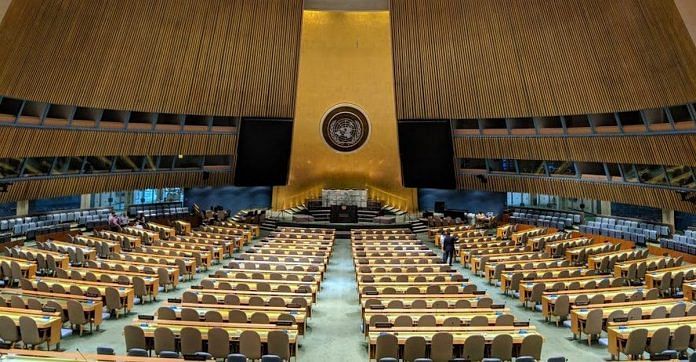As United Nations turns 73 Wednesday, ThePrint looks back at the circumstances that led to the creation of this international organisation.
New Delhi: In 1942, in the middle of World War II, then British PM Winston Churchill had visited Washington. It is believed that as he enjoyed a warm bubble bath in his tub, US President Franklin D. Roosevelt had a ‘eureka’ moment. The latter apparently barged into Churchill’s bathroom, and declared unabashedly ‘United Nations’, which eventually became the successor of the League of Nations.
The name, United Nations, once found a mention in one of Lord Byron’s poems, Childe Harold’s Pilgrimage:
“Here, where the sword united nations drew,
Our countrymen were warring on that day!
And this much — and all — which will not pass away.”
Over the years, though, the UN has drawn flak from diplomats and foreign policy experts who believe it hasn’t been able to deliver its promise of peace for the future generation.
“It is better to have an imperfect international organisation than to have none,” says Kanwal Sibal, former foreign secretary.
He, however, believes that despite its deficiencies, the UN is the only legitimate international organisation.
“It has not always been successful, but that is because it still operates on a power division that applied in 1945,” he adds.
Structurally speaking, the United Nations creates a divide between permanent members and other members. “This goes against the principle of sovereign equality,” says Sibal.
“It may not have been able to check the big powers at all times, but there is always an effort to get the UN to intervene. It adds moral legitimacy to the cause,” he adds.
Also read: India disputes UN chief’s report on children and armed conflict
On United Nations Day Wednesday, ThePrint looks back at the circumstances that led to the creation of this international organisation.
A brief history
After the League of Nations, established after the end of World War I in 1919, failed to prevent the second world war, leaders across the globe felt it was time for a new international organisation to take charge.
Established on 24 October 1945, with 51 member states, the UN became its successor. The organisation that turns 73 Wednesday has 193 members. South Sudan, which joined the UN in 2011, is the new entrant to this global forum.
France, China, Russia, the United Kingdom and the United States are the permanent members of the UN Security Council and they possess what is known as the ‘veto’ power. India, also a founding member, has been consistently working for a seat at the table, as has Japan.
The UN has six official languages — Arabic, Chinese, English, French, Russian, and Spanish.
The UN Charter, first ratified in 1945, outlines four basic aims of the international establishment:
“To save succeeding generations from the scourge of war,…to reaffirm faith in fundamental human rights,…to establish conditions under which justice and respect for the obligations arising from treaties and other sources of international law can be maintained, and to promote social progress and better standards of life in larger freedom”.
The member states, depending on their capability, contribute to its budget. The US pitches in with the lion’s share — 22 per cent of the total budget. America also contributes 27 per cent of the total expenditure on peacekeeping forces, a budget that is calculated separately.
Also read: The UN’s Kashmir report is weirdly silent on Pakistan’s dreaded terrorist groups
Good and bad of UN
The UN is credited with providing food to 90 million people in more than 75 countries. It has also assisted more than 34 million refugees and authorised 71 international peacekeeping missions.
It played a pivotal role in protecting the Galapagos Islands, a rich hub of bio-diversity, and also the site where Charles Darwin formulated his theory of evolution.
Although the UN is considered crusader for human rights, it has drawn flak for certain failures. For instance, the UN was unable to prevent the Rwandan genocide in which the Hutu majority murdered nearly 8 lakh people from the Tutsi minority before it could galvanise its forces.
Another criticism is the rape and abuse of children by UN peacekeepers. Accusations have filtered in over the years from countries such as Congo, Bosnia, Haiti and Cambodia.
“However, we must also remember that whenever an independent international investigation has to be conducted, it is the UN that we look to. Never an individual power,” says Sibal.



